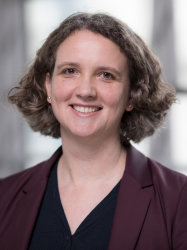Research Overview
Aimee Morgans' research aims to use fluid dynamics and acoustics to make energy generation and transport more environmentally friendly, and to mitigate the effect of climate extremes. Her main research areas are:
- Thermoacoustic instability in future low or zero-carbon gas turbines and rocket engines.
- The aerodynamic drag and unsteadiness of bluff bodies. This includes the aerodynamic drag of road vehicles, and the unsteady aerodynamic wind loading of high rise buildings.
- Aeroacoustics, acoustic damping, flow instability and feedback control of fluid flows in general.
PhD Opportunities
Prof Morgans considers PhD applications from students with a good Masters degree from a top university. Funding cannot be provided for non-EU students, but exceptionally qualified candidates should consider applying for an Imperial Scholarship. Note that the deadline for these is very early, typically in the January before admission.
Internships: note that unfortunately Prof Morgans does not take internship students and cannot respond to enquiries on internships.
Modelling and control of combustion instability
Thermoacoustic instability, also known as combustion instability, is caused by a two-way coupling between acoustic waves and unsteady heat release. For example, unsteady heat release from a flame generates acoustic waves. These propagate within the combustor, reflect from boundaries and arrive back at the flame, where they generate more unsteady heat release. The cycle may repeat, leading to successively increasing amplitudes.
Thermoacoustic instabilities are noisy and the resulting vibration can cause severe damage. They are a long-standing and serious problem for gas turbines, with low NOx combustors especially susceptible. With the current move towards low and zero carbon fuels, it is notable that hydrogen appears to significantly increase propensity to thermoacoustic instability.
Our research is improving modelling, understanding and computational prediction of thermoacoustic instability. Our open source tool for simulating thermoacoustic instability, called OSCILOS (Open Source Combustion Instability Low Order Simulator), can be found at www.oscilos.com.
We are also researching methods of suppressing instability using both active (feedback) and passive control.
Feedback control of bluff bodies for road vehicle drag reduction
At motorway/highway speeds, over half of the driving resistance of a road vehicle is caused by aerodynamic drag. For electric vehicles, reducing aerodynamic drag would directly lead to an increase in range. The main contributor to aerodynamic drag is pressure drag, also known as form drag. This arises due to the separation of the flow over the rear of the vehicle, forming a low pressure wake region.
We are investigating the wake flows of blunt bluff bodies, such as road vehicles, and are particularly interested in wake asymmetries that occur. We are also investigating the use of feedback control to improve the pressure recovery, hence reducing the pressure drag. In practice, feedback control involves forcing actuators (such as slot jets or small flaps) located at the rear of the vehicle in response to pressure readings. This work is mainly computational, using Large Eddy Simulations.
Other Research
- Reducing the unsteady loading of high rise buildings subjected to extreme winds
- Aeroacoustics of holes, resonators and heat exchanger tubes
- Computational aeroacoustics, including integral methods for rotor noise prediction and linearised solvers for confined flows.
Research Group
Current PhD students:
Pietro Giraudi
Zhengli Lim
Xiao (Shawn) Hu
Dania Ahmed
Current Postdocs:
Dr Lionel Hirschberg
Dr Juan Guzman
Previous PhD students:
Dr Saikumar Reddy Yeddula (passed viva 2021)
Dr Faron Hesse (passed viva 2021)
Dr Francesca Sogaro (passed viva 2020)
Dr Yu (Steven) Xia (passed viva 2019)
Dr Laurent Dalla Longa (passed viva 2018)
Dr Olga Evstafyeva (passed viva 2018)
Dr Dong Yang (graduated 2017)
Dr Thibault Flinois (graduated 2016)
Dr Charles Luzzato (graduated 2015)
Dr Georgios Rigas (graduated 2015)
Dr Jeremy Dahan (graduated 2013)
Dr Chee Su Goh (graduated 2012)
Dr Simon Illingworth (graduated 2010)
Dr Dan Zhao (graduated 2009)
Previous Postdocs:
Dr Renaud Gaudron
Dr Dong Yang
Dr Jialin Su
Dr Aswathy Surendran
Dr Davide Laera
Dr Jingxuan Li
Dr Holly Johnson
Dr Ignacio Duran
Dr Xingsi Han
Dr Charles Luzzato
Dr Jeremy Dahan
Google scholar citations
http://scholar.google.co.uk/citations?hl=en&user=bh0cNEsAAAAJ
Collaborators
Dr Rama Balachandran, University College London, 2015
Prof James Dawson and Prof Nicholas Worth, NTNU Trondheim, Norway, 2015
Prof Peter Schmid, Dept of Mathematics, Imperial College London, 2014
Prof Kai Luo, University College London
Prof Xuesong Wu, Dept of Mathematics, Imperial College London
Prof Jonathon Morrison, Dept. of Aeronautics, Imperial College London
Dr Raphael Assier, University of Manchester
Prof Denis Sipp, ONERA, France
Prof Jon Carrotte, Dr Andrew Garmory, Loughborough University
Prof Dame Ann Dowling, Dr Matthew Juniper, Prof Simone Hochgreb, University of Cambridge
Prof Clancy Rowley, Princeton University
Dr Sylvain Lardeau, CD-adapco

